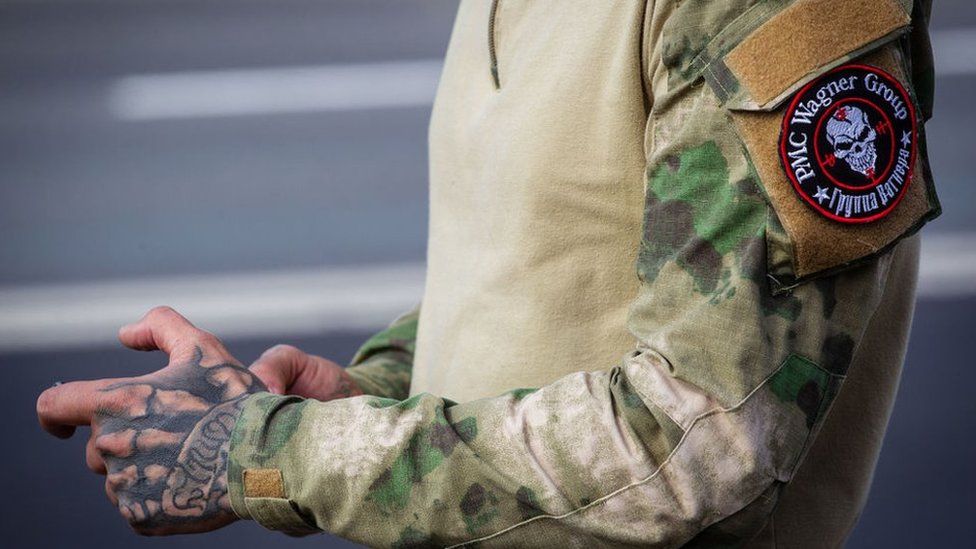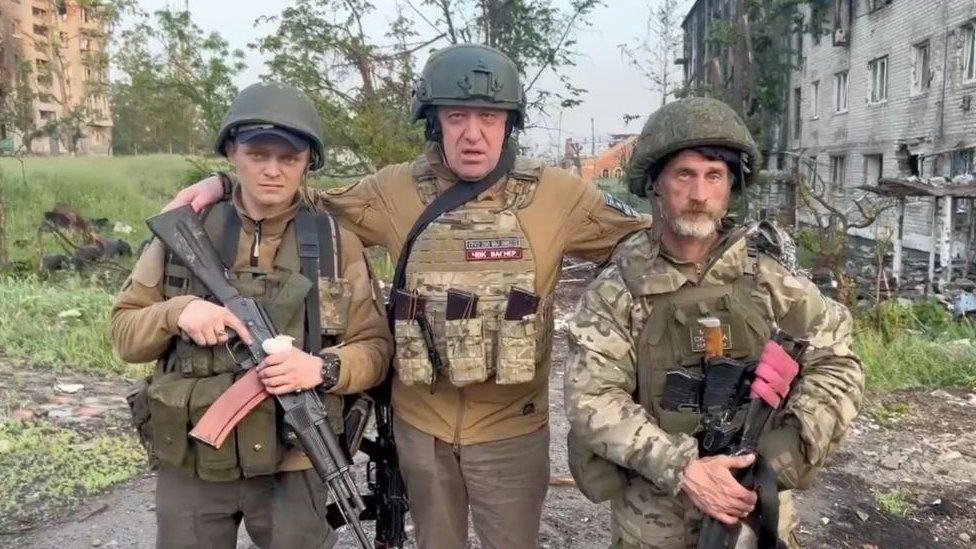Wagner to be declared a terrorist organisation by UK

Wagner, the Russian mercenary group, is set to be proscribed as a terrorist group by the UK government – meaning it will be illegal to be a member or support the organisation.
A draft order to be laid in Parliament will allow its assets to be categorised as terrorist property and seized.
The home secretary said Wagner was “violent and destructive… a military tool of Vladimir Putin’s Russia”.
She said its work in Ukraine and Africa was a “threat to global security”.
Suella Braverman added: “Wagner’s continuing destabilising activities only continue to serve the Kremlin’s political goals.”
“They are terrorists, plain and simple – and this proscription order makes that clear in UK law.”
Wagner had played a key role in Russia’s invasion of Ukraine, as well as operating in Syria and countries in Africa including Libya and Mali.
Its fighters have been accused of a number crimes including killing and torturing Ukrainian citizens.
- Is Wagner still a threat to global security?
In 2020, the US said Wagner soldiers had planted landmines around the Libyan capital, Tripoli.
And in July, the UK said the group had carried out “executions and torture in Mali and the Central African Republic”.
The group’s future was thrown into uncertainty earlier this year when its leader Yevgeny Prigozhin led a failed mutiny against Russia’s military leaders.
- What is Russia’s Wagner mercenary group?
- What now for Wagner after Prigozhin’s death?
Prigozhin, who founded the group in 2014, died in a suspicious plane crash along with other Wagner figures on 23 August and was buried in St Petersburg.
The group’s name will now be added alongside that of other proscribed organisations in the UK such as Hamas and Boko Haram.
The Terrorism Act 2000 gives the home secretary the power to proscribe an organisation if they believe it is concerned in terrorism.
Before the act, it was only possible to proscribe organisations connected to terrorism in Northern Ireland.
The proscription order will make it a criminal offence to support the group – including by arranging a meetings aimed at furthering the organisation’s activities, expressing support for its aims or displaying its flag or logo.
Committing a proscription offence could lead to 14 years in prison or a fine of up to £5,000.
The government had come under pressure from MPs for some months to proscribe the group.
Earlier this year, Labour’s shadow foreign secretary David Lammy urged the government to proscribe Wagner saying it was “responsible for the appalling atrocities in Ukraine and across the world”.
Welcoming the draft order on Tuesday, Mr Lammy said on social media: “This is long overdue, but it’s welcome the government has finally acted. Now the government should press for a Special Tribunal to prosecute Putin for his crime of aggression.”
The Foreign Office had imposed sanctions on the group, including freezing the assets of Prigozhin and several top commanders.
However, Chair of the Foreign Affairs Committee and Conservative MP Alicia Kearns said in July: “Sanctions are not enough – the UK needs to proscribe the Wagner group for what it is: a terrorist organisation.”
Her committee also produced a report which said the government had been “remarkably complacent” and criticised its “dismal lack of understanding of Wagner’s hold beyond Europe, in particular their grip on African states”.
The Wagner Group has been seriously weakened by its failed mutiny in June against Russia’s generals, as well as the recent death in the plane crash of its top leadership, BBC Security Correspondent Frank Gardner writes.
But proscribing it in law will make it harder for members to move money around, our correspondent adds. It will also provide a legal basis for Ukrainians and others to sue Wagner for potentially billions of pounds in compensation through the British courts.
Related Topics
- Russia-Ukraine war
- Home Office
- Russia
- Counter-terrorism
-
Is Wagner still a threat to global security?
-
2 hours ago

-
Published at Tue, 05 Sep 2023 23:03:47 +0000
